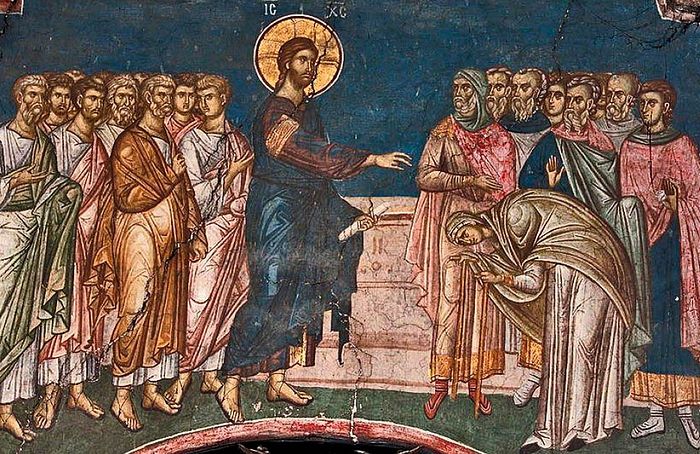Now Jesus was teaching in one of the synagogues on the sabbath. And there was a woman who had had a spirit of infirmity for eighteen years; she was bent over and could not fully straighten herself. And when Jesus saw her, he called her and said to her, “Woman, you are freed from your infirmity.” And he laid his hands upon her, and immediately she was made straight, and she praised God. But the ruler of the synagogue, indignant because Jesus had healed on the sabbath, said to the people, “There are six days on which work ought to be done; come on those days and be healed, and not on the sabbath day.” Then the Lord answered him, “You hypocrites! Does not each of you on the sabbath untie his ox or his ass from the manger, and lead it away to water it? And ought not this woman, a daughter of Abraham whom Satan bound for eighteen years, be loosed from this bond on the sabbath day?” As he said this, all his adversaries were put to shame; and all the people rejoiced at all the glorious things that were done by him. (Luke 13:10-17)
New Testament scholar N. T. Wright comments on how ‘the Law’ could be misunderstood or misapplied in life. Torah was not meant to oppose ritualistic law to virtues – compassion, mercy, love. One however could find oneself in the troubling position of having to choose to help someone (show mercy) on the Sabbath but the very thing you need to do would violate the Law of Sabbath rest, and would be so interpreted by some Jewish leaders. Mercy should win out in such cases. This is what Jesus taught – there is no conflict with the Sabbath rest if someone needs your mercy. Mercy is not opposed to rest for it gives rest to the one in need. Wright comments:
Within this, a major theme emerges in which the sabbath principle and command find a new focus, though with echoes of the Deuteronomy principle (sabbath as liberation for the slaves). The sabbath becomes the sign of God’s justice and care for the poor, and even for slaves and animals. Thus, in Exodus 23:11, the sabbath is the chance for the poor to rest; this includes slaves and animals too. This principle blossoms, importantly, into a theme which looks quite different to begin with but actually belongs very closely with the sabbath: the Jubilee. (Scripture and the Authority of God: How to Read the Bible Today, Kindle Loc 2108-12)
The Sabbath was given as a day of rest for all including slaves and animals from their labors, troubles, burdens. This is the principle to which Jesus appeals in the synagogue: You are supposed to give rest to slaves and animals on the Sabbath, does not this apply to relieving any human in need as well? In Luke 13:10-17, Jesus is being very specific about one person: does not this woman, a faithful Israelite, deserve rest from her burden on the Sabbath as well? If my action of mercy gives her rest from her burden on the Sabbath, is not my action righteous?
“Six days you shall do your work, but on the seventh day you shall rest; that your ox and your ass may have rest, and the son of your bondmaid, and the alien, may be refreshed.” (Exodus 23:12)
Healing on the Sabbath thus fulfills the law not violate it according to Jesus. Note in Luke 13:10-17 the way the ruler of the synagogue words his criticism – he aims it at the woman (“come on those days and be healed“) not at Jesus the Healer. He blames her for violating the Sabbath not Jesus. He criticizes the one who now has rest, not the one who has given her rest. Maybe he felt he could not criticize someone who had just performed a healing miracle in the synagogue. Or maybe it was just a misogynistic comment and had nothing to do with miracles at all. In any case, Jesus not only heals the woman but defends her as a daughter of Abraham. She is not just some foolish or troublesome woman, she is part of the chosen ones of God! The people in the synagogue should be honoring her, not criticizing her. Jesus will not accept a “good ol’ boy” comment from the synagogue ruler. He rebukes the patriarchal paternalism of religious leadership.
Furthermore, we can see in Mark 1:23, a demon possessed man is in the synagogue – for all we criticize the Pharisees, we can see that they had sinners in their assemblies. Even the demon possessed came into the synagogues where Jesus is. We should think about that in terms of our Sunday Liturgies. Do we exclude sinners from coming to Christ for healing? Which assembly is Christ most likely to attend – the one with demoniacs, sinners and the sick, or the one which excludes such people from their assembly?
St. Mark the Ascetic offers an interpretation of the Sabbath commandment which moves away from a literal understanding of it. For St Mark the six days of work simply means to do works of kindness, charity and mercy – that is the normal labor of Christians in our daily lives. A Sabbath rest from such work comes when you follow the command of Christ to give all your possessions away to follow Christ. Only then are you no longer obligated to do works of charity since you now own nothing and have nothing to give away.
The Law figuratively commands men to work for six days and on the seventh to rest (cf. Exod. 20:9-10). The term ‘work’ when applied to the soul signifies acts of kindness and generosity by means of our possessions – that is, through material things. But the soul’s rest and repose is to sell everything and ‘give to the poor’ (Matt. 19:21), as Christ Himself said; so through its lack of possessions it will rest from its work and devote itself to spiritual hope. Such is the rest into which Paul also exhorts us to enter, saying: ‘Let us strive therefore to enter into that rest‘ (Heb. 4:11). (The Philokalia, Kindle Loc. 3886-94)
Apparently for St Mark it is those of us who aren’t in monasteries who are obliged to fulfill the Gospel commandments to love, give in charity, show mercy, kindness, compassion and care for the poor and needy. Those who enter the monastic life can rest from those labors as they have given everything away – they can then devote themselves to prayer and fasting. Those of us committed to the married life and to our families have the additional obligation, responsibility and work of caring for the poor and needy. It is through acts of charity, almsgiving, mercy, kindness and generosity that we follow Christ and live as the holy ones of God.
As St. John Cassian notes:
And fasting, as beneficial and necessary as it may be, is nonetheless a gift that is voluntarily offered, whereas the requirements of the commandment demand that the work of love be carried out. And so I welcome Christ in you and must refresh him.” (The Institutes, pp 132-133)
For St. John Cassian fasting is a voluntary labor, but hospitality is commanded by Christ in the Gospels. Not everyone can fast but everyone can be merciful. St Gregory the Great says:
My friends, love hospitality, love the works of mercy. Paul said: Let the love of the brotherhood remain, and do not forget hospitality; it was by this that some have been made acceptable, having entertained angels hospitably; and Peter told us to be hospitable to one another, without complaints; and Truth himself said: I needed hospitality, and you welcomed me. And yet often we feel no inclination to offer the gift of hospitality. But consider, my friends, how great this virtue of hospitality is! Receive Christ at your tables, so that he will receive you at the eternal banquet. Offer hospitality now to Christ the stranger, so that at the judgement you will not be a stranger but he will accept you into his kingdom as one he knows.” (Be Friends of God, pp 62-64)




